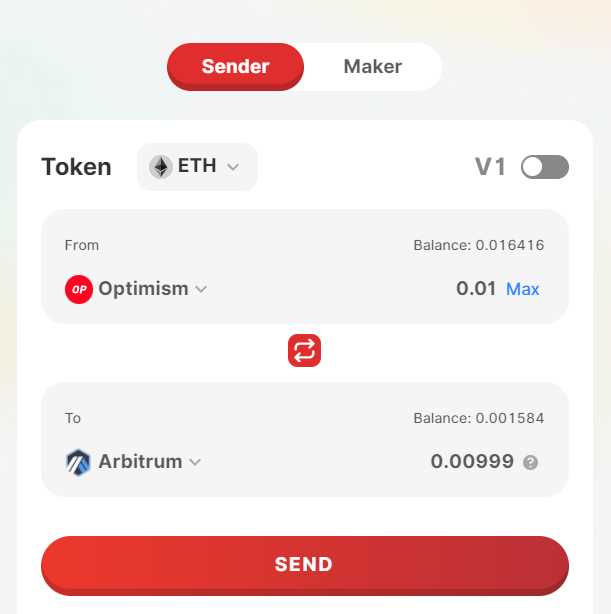
Exploring the Importance of the “Sender” in Orbiter Finance: A Comprehensive Guide to Its Functionality

Orbiter Finance has revolutionized the world of cryptocurrency transactions, and understanding the role of the “Sender” is crucial in comprehending how this innovative system works.
The “Sender” in Orbiter Finance refers to the individual or entity initiating a transaction, transferring funds from their account to another party. This role is integral to the secure and efficient functioning of the platform, ensuring that transactions are executed with accuracy and reliability.
So how does the “Sender” role function within the Orbiter Finance ecosystem?
When a user intends to send cryptocurrency, they first authenticate their identity and initiate the transaction by providing the necessary details, including the recipient’s wallet address and the amount to be transferred. The ‘Sender” then authorizes the transaction, verifying ownership and ensuring the availability of sufficient funds.
But how does Orbiter Finance guarantee the security and integrity of these transactions?
Orbiter Finance utilizes advanced encryption technology and a distributed ledger system, such as blockchain, to secure the Sender’s transaction. Each transaction is verified by a network of nodes, ensuring its validity and preventing any potential fraudulent activity. This decentralized verification process makes it virtually impossible for malicious actors to manipulate or alter transactions.
What are the advantages of the Sender role in Orbiter Finance?
Firstly, the Sender’s role allows for seamless and frictionless transactions, eliminating the need for intermediaries such as banks or financial institutions. This not only saves time but also reduces costs associated with third-party involvement.
Additionally, the Sender role ensures transparency, as each transaction is recorded on the distributed ledger. This enhances accountability and traceability, providing users with a clear audit trail of their financial activities.
In conclusion, understanding the role of the “Sender” in Orbiter Finance is essential for participants in the cryptocurrency ecosystem. By comprehending how this role functions, users can confidently engage in secure and efficient transactions, making the most of the innovative features offered by Orbiter Finance.
Understanding the Role of “Sender” in Orbiter Finance

In the world of decentralized finance (DeFi), platforms like Orbiter Finance have emerged to provide users with innovative ways to interact with the blockchain. One key element of Orbiter Finance’s functionality is the concept of a “sender.”
The sender, in the context of Orbiter Finance, refers to the wallet address or account that initiates a transaction on the platform. This could be an individual user, a smart contract, or even an automated system.
The sender plays a crucial role in the Orbiter Finance ecosystem. It is responsible for initiating various actions, such as sending funds, executing smart contracts, and interacting with other users or protocols within the platform.
When a transaction is initiated by a sender, it is broadcasted to the blockchain network, where it is validated and added to a block. This ensures that the transaction is transparent, secure, and immutable.
Additionally, the sender’s wallet address is used to track transaction history and account balances. This information is crucial for users to keep track of their financial activities and assets within the platform.
Furthermore, the sender’s identity can also play a role in governance and decision-making processes within Orbiter Finance. Depending on the platform’s governance model, the sender’s voting power or reputation may influence the outcome of proposals or protocol upgrades.
| Role | Functions |
|---|---|
| Initiates Transactions | Sending funds, executing smart contracts, interacting with other users or protocols |
| Provides Transaction History | Tracks transaction history and account balances for users |
| Influence in Governance | Voting power or reputation may impact decision-making processes |
Overall, the sender plays a critical role in the Orbiter Finance ecosystem by initiating transactions, providing transaction history, and potentially influencing governance decisions. Understanding the sender’s role is essential for users to fully grasp the workings of Orbiter Finance and effectively participate in its decentralized finance ecosystem.
Exploring the Importance of the “Sender” Role in Orbiter Finance

The role of the “sender” in Orbiter Finance is a crucial part of the platform’s functionality. As the name suggests, the sender is responsible for initiating and sending transactions within the Orbiter Finance ecosystem.
When an individual or entity wants to send a cryptocurrency or token on the Orbiter Finance platform, they must assume the role of the sender. This role involves providing the necessary information and initiating the transfer process.
One key aspect of the sender role is ensuring the accuracy and validity of the transaction. The sender must verify that the recipient’s address is correct and double-check all transaction details before sending the funds. Any errors or discrepancies could result in the loss of funds or failed transfers.
Additionally, the sender plays a critical role in maintaining the security of the transaction. Before initiating the transfer, the sender must authenticate their identity and provide any required security protocols, such as two-factor authentication or a passphrase. This helps prevent unauthorized individuals from sending funds or accessing sensitive information.
Furthermore, the sender plays a vital role in the transparency and accountability of the Orbiter Finance platform. Each transaction initiated by the sender is recorded on the blockchain, creating a traceable record of the sender’s activity. This adds transparency to the platform and allows for auditing and verification of transactions.
In conclusion, the sender’s role in Orbiter Finance is essential in facilitating secure, accurate, and transparent transactions within the platform. Their responsibilities include initiating transfers, verifying transaction details, maintaining security measures, and ensuring accountability. The sender’s actions are integral to the overall functioning and success of Orbiter Finance.
How the “Sender” in Orbiter Finance Facilitates Transactions

The “sender” plays a crucial role in facilitating transactions within the Orbiter Finance ecosystem. When a user initiates a transaction, the sender is responsible for transmitting the necessary information to execute the transaction successfully.
At its core, the sender acts as the source of the transaction, providing the necessary funds or assets to be transferred. This could include cryptocurrencies, tokens, or any other digital assets supported by Orbiter Finance.
To initiate a transaction, the sender must first have a digital wallet compatible with the Orbiter Finance platform. This wallet acts as the storage for the sender’s funds and allows them to send and receive assets within the ecosystem.
When a user wants to send funds to another user or participate in a liquidity pool, they start by providing the recipient’s wallet address as well as the desired amount of funds to be sent. The sender’s wallet then generates a unique transaction hash that represents the transfer and includes it in the transaction data.
The sender’s wallet securely signs the transaction using their private key, ensuring the authenticity and integrity of the transaction. This ensures that only the intended sender can initiate the transaction and prevents unauthorized or fraudulent activity.
Once the transaction is signed, the sender’s wallet broadcasts it to the Orbiter Finance network. The network then verifies the validity of the transaction by checking details such as the sender’s balance and sufficient funds availability.
If the transaction is valid, it is added to the Orbiter Finance blockchain and included in the next block of transactions. This block is then added to the chain, providing a secure and transparent record of all transactions within the ecosystem.
Throughout the entire transaction process, the sender maintains control over their funds, ensuring they are safely and securely transferred to the intended recipient.
Benefits of the sender in Orbiter Finance:

The sender plays a critical role in facilitating transactions within the Orbiter Finance ecosystem, offering several benefits:
- Control: The sender has complete control over their funds and can choose when and how to send them.
- Security: Transactions initiated by the sender are securely signed using their private key, ensuring the integrity and authenticity of the transaction.
- Transparency: The sender’s transaction is recorded on the Orbiter Finance blockchain, providing a transparent and tamper-proof record of all transactions.
- Flexibility: The sender can send any supported digital asset within the Orbiter Finance ecosystem, providing flexibility in transaction options.
In conclusion, the sender is a crucial component of the Orbiter Finance ecosystem, allowing users to securely and efficiently send funds and assets within the platform. Through the sender’s role, Orbiter Finance ensures the integrity, transparency, and flexibility of transactions, providing users with a seamless and reliable experience.
The Impact of the “Sender” in Orbiter Finance on Security and Transparency

Orbiter Finance employs a unique “sender” system that plays a crucial role in ensuring security and transparency within the platform. The “sender” is responsible for initiating and executing transactions, making it a central figure in the ecosystem.
One of the key impacts of the “sender” is enhanced security. By having a designated entity responsible for initiating transactions, Orbiter Finance minimizes the risk of unauthorized access and potential fraudulent activities. This ensures that only authorized individuals or entities can initiate and execute transactions, providing users with a more secure environment.
The “sender” also contributes to a higher level of transparency in Orbiter Finance. With a designated and identifiable entity responsible for transactions, all actions can be easily traced back to the source. This promotes accountability and ensures that any issues or discrepancies can be promptly identified and resolved. Users can have confidence in the integrity of the platform, as all transactions can be easily audited.
Furthermore, the use of a “sender” system adds an extra layer of protection against potential errors or mistakes. By centralizing transaction initiation, Orbiter Finance reduces the risk of human error that may occur when multiple parties are involved in transaction execution. This enhances the overall reliability and accuracy of the platform.
Conclusion

The “sender” plays a critical role in Orbiter Finance, contributing to both security and transparency. By having a designated entity responsible for transaction initiation, the platform ensures a more secure environment for users. Additionally, the “sender” system adds transparency, allowing for easy tracing of actions and promoting accountability. With these benefits, Orbiter Finance provides users with a reliable and trustworthy financial ecosystem.
Q&A:
What is “Sender” and how does it relate to Orbiter Finance?
“Sender” is a role in Orbiter Finance that refers to the individual or entity responsible for sending funds to a particular recipient. In the context of Orbiter Finance, the Sender plays a crucial role in initiating transactions and ensuring that the funds are securely transferred to the intended recipient.
What are the responsibilities of the “Sender” in Orbiter Finance?
The primary responsibility of the “Sender” in Orbiter Finance is to initiate transactions by sending funds to the intended recipient. This involves providing the necessary information such as the recipient’s address and the amount of funds to be sent. The Sender is also responsible for ensuring the accuracy and security of the transaction process.
Can anyone become a “Sender” in Orbiter Finance?
Yes, anyone can become a “Sender” in Orbiter Finance as long as they meet the requirements and follow the necessary steps. Becoming a Sender typically involves creating an account on the Orbiter Finance platform, completing the verification process, and complying with any applicable regulations or policies. Once these steps are fulfilled, individuals or entities can start sending funds through Orbiter Finance as Senders.


